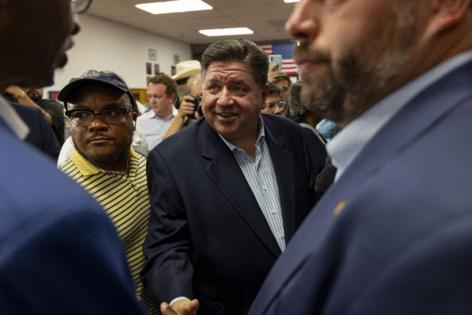Commentary: Once again, politicians are choosing their voters. It's time for voters to choose back
Published in Op Eds
Once again, politicians are trying to choose their voters to guarantee their own victories before the first ballot is cast.
In the latest round of redistricting wars, Texas Republicans are attempting a rare mid-decade redistricting to boost their advantage ahead of the 2026 midterms, and Democratic governors in California and New York are signaling they’re ready to “fight fire with fire” with their own partisan gerrymanders.
It’s a tempting strategy. But gerrymanders for a good short-term cause are still unfair to voters, and this tit-for-tat constitutional hardball is just another stop on the longer road to democratic collapse.
If party leaders insist on running from competition, then it’s time for voters to run toward it. And in many states, the best tool available to do that is the citizen-led ballot initiative—a way for ordinary people to demand fair representation when legislators won’t deliver it.
Ballot initiatives allow voters to bypass gridlocked and unresponsive legislatures and change the rules of the game directly. In states that allow them, citizens have enacted reforms that legislators refused to touch: Michigan’s citizen-led independent redistricting commission cleaned up partisan gerrymandering; Maine’s switch to ranked-choice voting elevated and protected moderates like Rep. Jared Golden and Sen. Susan Collins; Arizona’s public campaign financing system increased competitiveness. These reforms didn’t come from the top down; they were bottom-up demands for a democracy that works.
Initiatives work. They help realign public policy with the public interest where the gaps are largest and make elected officials more accountable. And when they’re used to fix the deeper structural problems—like single-member districts, winner-takes-all elections— they can even make themselves less necessary over time.
That’s why we need them now. So we won’t need them as much in the future.
Unfortunately, not everyone has access to statewide ballot initiatives. Only about half of the U.S. states allow citizens to place new laws on the ballot. The rest—including Texas—leave voters in a Catch-22: They need structural reform to make government responsive, but can’t get reform because government isn’t responsive.
Right now, voters in states that have a statewide initiative process but haven’t yet adopted independent redistricting commissions should start organizing for that—or, even better, for multi-member state legislative districts elected via proportional representation, which would make gerrymandering obsolete. Voters in places like Nevada, Missouri, and Florida don’t need to wait for their state legislatures, the courts, or Congress to upgrade their systems.
By contrast, Texas’s roughly 19 million registered voters currently have no pathway to change that that doesn’t begin inside the statehouse. And polling suggests Texans aren’t thrilled with the status quo. A recent survey found that 63 percent of Texas voters view the redistricting push as unnecessary. Another Texas poll from 2010 found 68% support for adopting a statewide initiative process. Several bills to create one in Texas have been introduced in recent years. For now, though, the people’s hands are tied.
Creating a new ballot initiative process is no easy task. It bumps into the Catch-22 as before. In every state without ballot initiatives, creating a process for them requires a constitutional amendment, which, absent a constitutional convention, must be initiated by the legislature. However, there’s a difference between political reform groups asking lawmakers to vote to create an independent commission and a large, broad-based coalition asking them to give the public a new way to propose ideas in the future. That second ask—about democratic process, not specific policy outcomes—might be harder to reject without political consequences.
We’ve been here before. Between 1898 and 1920, amid corruption, inequality, and political capture, 21 states enshrined initiative systems into their constitutions. Many lawmakers supported the change not out of principle, but because they saw the writing on the wall.
Ballot initiatives aren’t perfect. They can be expensive, distorted by special interests, or weaponized to harm vulnerable communities. But in moments of democratic backsliding, they’re one of the only tools voters have to rebalance the system and reclaim their power.
Let’s use and expand their use now—strategically and responsibly—so we can build a democracy that no longer needs them.
_____
Maresa Strano is the deputy director of the Political Reform program at New America.
_____
©2025 The Fulcrum. Visit at thefulcrum.us. Distributed by Tribune Content Agency, LLC.

























































Comments